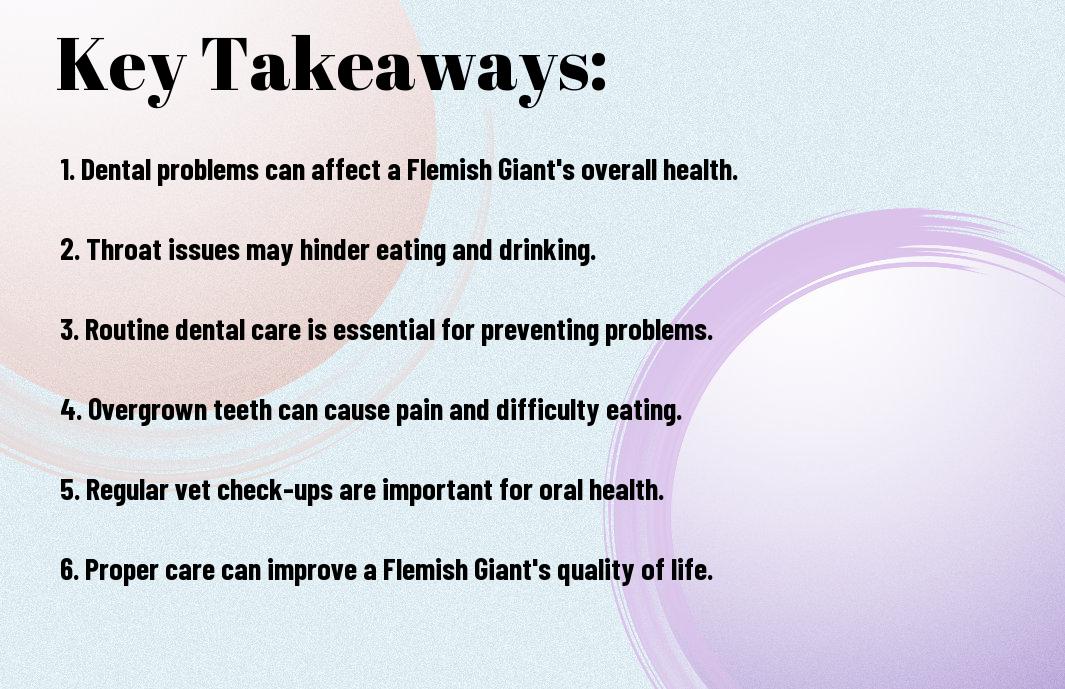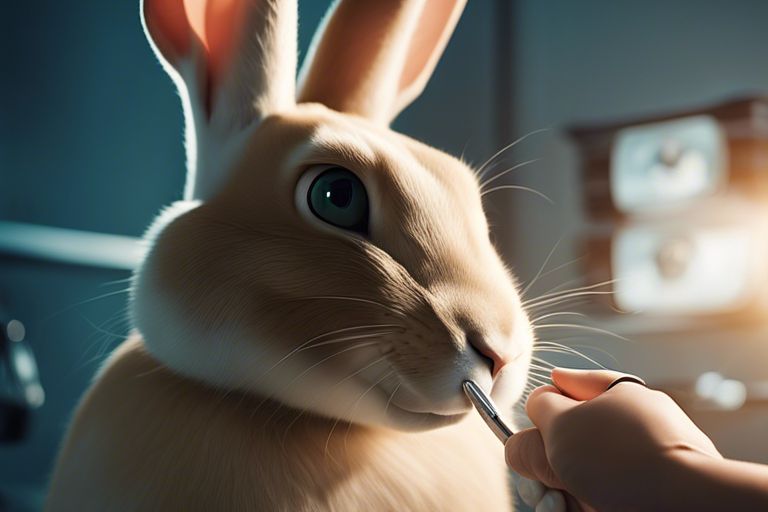Have you noticed unusual drooling, difficulty eating, or a change in vocalization in your Flemish Giant rabbit? These may be signs of throat dental problems that could be hindering your pet’s health and well-being. It’s important to understand the potential issues and take preventive measures to ensure your beloved pet is in good health.
Key Takeaways:
- Regular dental check-ups are crucial for identifying and addressing any dental problems in Flemish Giants. Dental issues can lead to major health complications if left untreated.
- Signs of dental problems in Flemish Giants include drooling, difficulty eating, weight loss, and a change in behavior. It’s important to be vigilant and seek prompt veterinary care if any of these signs are observed.
- Proper diet and preventive care can help maintain good oral health for Flemish Giants. Providing chew toys, high-fiber hay, and regular teeth checks can help prevent dental problems.
- Professional dental treatment may be necessary for Flemish Giants with dental issues, such as overgrown teeth or abscesses. Dental procedures should be performed by a knowledgeable veterinarian to ensure the safety and well-being of the rabbit.
- Consult a veterinarian for any concerns about your Flemish Giant’s dental health. They can provide personalized advice and treatment options to address any dental problems and improve your rabbit’s overall well-being.

Recognizing Throat Dental Problems
The health of your Flemish Giant is of utmost importance, and being aware of potential dental issues is crucial. One common problem that can have a significant impact on your rabbit’s health is throat dental problems. These issues can be tricky to recognize at first, but they can have serious implications if left untreated. To help you better understand this issue, watch this informative video called “Dr. T – A Flemish Giant Problem – Facebook”.
Symptoms and Diagnosis
Throat dental problems in Flemish Giants can manifest in various ways. You may notice that your rabbit is drooling excessively, struggling to eat, or displaying signs of pain while swallowing. Additionally, if you observe weight loss, bad breath, or a change in behavior, it could be indicative of an underlying dental issue. If you notice any of these symptoms, it is crucial to consult a veterinarian who has experience with rabbit dental care. A thorough oral examination and potential X-rays may be necessary to accurately diagnose the problem.
The Link to Overall Health
Understanding the link between throat dental problems and your Flemish Giant’s overall health is essential. Issues in the throat and oral cavity can lead to difficulty in eating, which could result in malnourishment and weight loss. Furthermore, these problems can cause your rabbit significant pain and discomfort, leading to a decrease in their quality of life. If left unaddressed, throat dental issues can also contribute to the development of other health conditions, making it imperative to address them promptly and effectively.
Preventive Care and Treatments
Now that you understand the potential impact of dental problems on your Flemish Giant’s overall health, it’s important to take a proactive approach to preventive care and treatments. By staying on top of your rabbit’s dental hygiene, you can help prevent serious health issues and ensure their well-being.
Regular Check-ups and Dental Care
Regular check-ups with a qualified veterinarian are crucial for maintaining your Flemish Giant’s dental health. During these visits, your vet can conduct oral exams and identify any potential issues early on. Additionally, they can provide professional dental cleanings to remove tartar and plaque that may have accumulated on your rabbit’s teeth. You should also establish a routine dental care regimen at home, including regular brushing and providing chew toys to help keep your rabbit’s teeth clean and healthy.
Remedies for Common Dental Issues
If your Flemish Giant does develop dental issues, it’s important to address them promptly. Common problems such as malocclusion, tooth abscesses, and overgrown teeth can lead to serious health complications if left untreated. Your vet may recommend filing down overgrown teeth, extracting abscessed teeth, or other necessary treatments to alleviate discomfort and prevent further complications. It’s crucial to follow your vet’s recommendations and administer any prescribed medications to address dental issues in a timely manner.
Remember, dental problems can have a significant impact on your Flemish Giant’s overall health and well-being. By prioritizing preventive care, regular check-ups, and prompt treatment of any dental issues, you can help ensure that your rabbit maintains optimal dental health and enjoys a high quality of life.
Diet and Nutrition for Optimal Dental Health
After consulting with your veterinarian, you may discover that your Flemish Giant’s dental problems could be improved with changes to their diet and nutrition. Diet plays a crucial role in your pet’s dental health, and ensuring they are getting the proper nutrients is key to preventing dental issues.
The Role of Pet Nutrition
Your Flemish Giant’s diet should consist of high-quality hay, fresh vegetables, and a limited amount of pellets. High fiber foods like hay and leafy greens can help wear down your pet’s teeth, reducing the risk of overgrown teeth and dental problems. Additionally, providing access to chew toys or untreated wooden blocks can help keep their teeth healthy and prevent dental issues.
Safe Foods and Dangerous Snacks
When it comes to maintaining optimal dental health for your Flemish Giant, it’s important to be aware of what foods are safe and which ones can be harmful. Safe foods for your pet include high-quality hay, fresh vegetables like kale, parsley, and broccoli, and a limited amount of specially formulated rabbit pellets. Avoid feeding your pet sugary treats, starchy foods, and hard foods that could cause dental damage.
The Broader Implications of Dental Health
To ensure the overall well-being of your Flemish Giant rabbit, it is important to understand the broader implications of dental health. Dental problems can impact not only your rabbit’s ability to eat and groom, but also their behavior, socialization, and long-term health.
Behavioral Changes and Socialization
Poor dental health in your Flemish Giant rabbit can lead to behavioral changes and impact their socialization. If your rabbit is experiencing pain or discomfort due to dental issues, they may become irritable, withdrawn, or less inclined to engage in social interactions with you and other pets. It is important to monitor your rabbit’s behavior closely and consult with a veterinarian if you notice any changes in their socialization patterns.
Long-term Health and Life Expectancy
Untreated dental problems can have serious long-term implications for your Flemish Giant rabbit’s health and life expectancy. Dental issues can lead to malnutrition, as your rabbit may struggle to eat properly, and can also increase the risk of developing other health problems. Regular dental check-ups and prompt treatment of any dental issues are essential for ensuring your rabbit’s long-term health and maximizing their life expectancy.

Could Throat Dental Problems Be Hindering Your Flemish Giant’s Health?
Drawing together the information presented, it is clear that throat dental problems can significantly impact your Flemish Giant’s health. It is important to be proactive in addressing dental issues and to seek regular check-ups with a knowledgeable veterinarian. By staying aware of the signs and symptoms of throat dental problems, you can ensure that your beloved pet remains healthy and happy.
FAQ
Q: What dental problems can affect my Flemish Giant’s health?
A: Dental problems such as overgrown teeth, malocclusion, or abscesses can hinder your Flemish Giant’s health. Overgrown teeth can cause difficulty in eating and lead to weight loss, while malocclusion can lead to jaw pain and difficulty closing the mouth. Abscesses can be painful and may lead to systemic infections if left untreated.
Q: How can I prevent dental problems in my Flemish Giant?
A: Regular dental check-ups are key to preventing dental problems in your Flemish Giant. Providing a diet high in fiber, such as hay, can help wear down their teeth naturally. Additionally, providing safe chewing toys can also help maintain proper dental health.
Q: What are the signs of dental problems in Flemish Giants?
A: Signs of dental problems in Flemish Giants may include difficulty eating, drooling, weight loss, a change in eating habits, pawing at the mouth, or swelling around the face. If you notice any of these signs, it’s important to seek veterinary care as soon as possible to address the issue.
